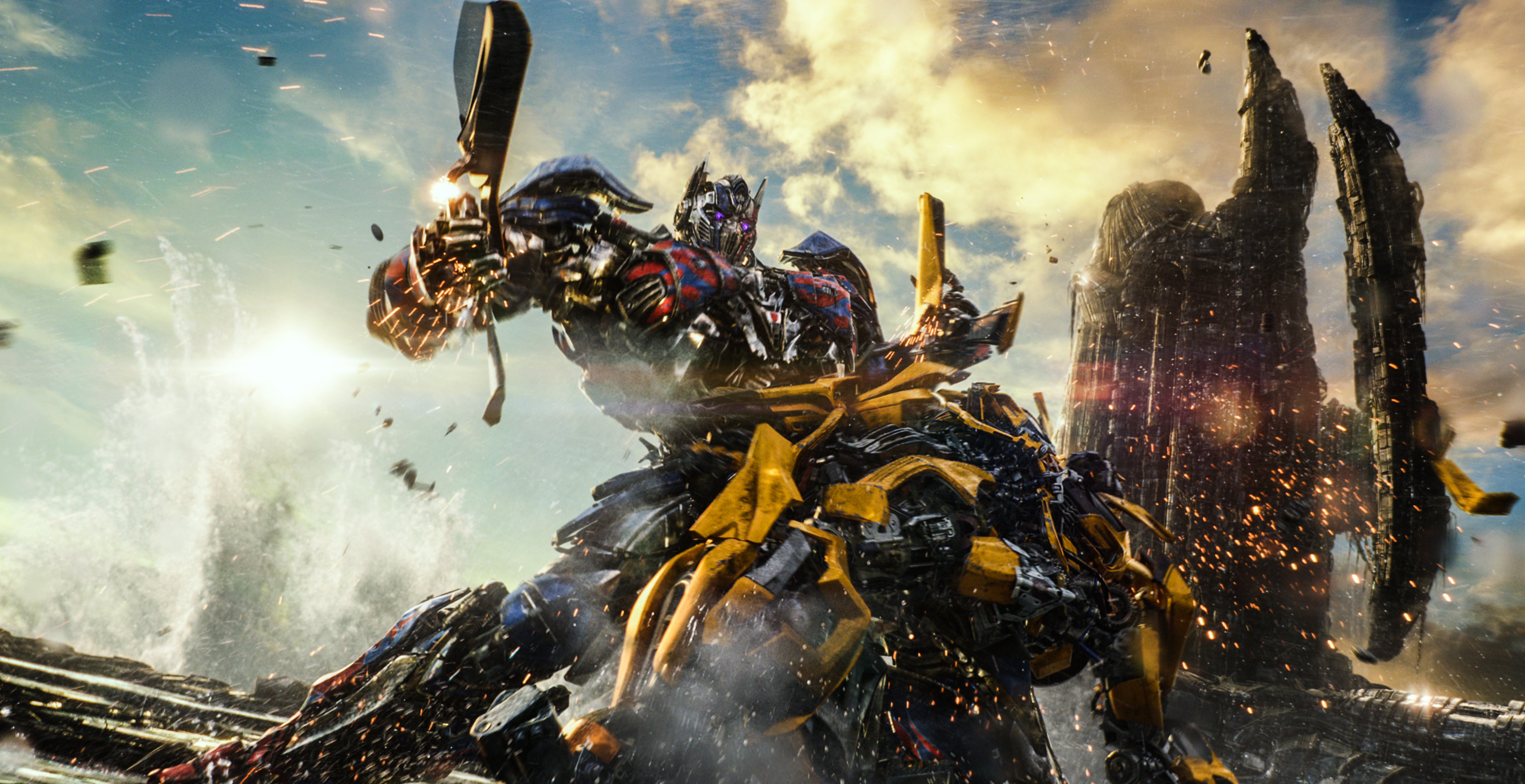Why Transformers 5 is worth cherishing
It's not very good. But it is very rare.


A free daily email with the biggest news stories of the day – and the best features from TheWeek.com
You are now subscribed
Your newsletter sign-up was successful
The newest Transformers movie is a rare thing: A fifth installment. As sequel-happy as studios can be, not that many franchises make it all the way to a fifth movie, and even fewer get there with the same director, in this case the unmistakable Michael Bay.
There are plenty of film series with five or more entries: Star Wars, James Bond, Marvel ... even DC is about to get there. But these series are all designed to weather cast changes, shifts in focus, and different filmmakers. They aren't traditional sequels like Transformers: The Last Knight or even Pirates of the Caribbean: Dead Men Tell No Tales, a pair of rare part fives attempting to gin up business this summer.
Both Pirates and Transformers command unusually large, elaborate productions for part fives. This wasn't the case for, say, Star Trek V: The Final Frontier, which despite following a big hit had its budget slashed during production, or Rocky V, which followed the popular Rocky IV with a more stripped-down approach. The combination of booming overseas markets and a well-oiled Hollywood marketing machine means that Pirates and Transformers are both as opulent-looking as ever.
The Week
Escape your echo chamber. Get the facts behind the news, plus analysis from multiple perspectives.

Sign up for The Week's Free Newsletters
From our morning news briefing to a weekly Good News Newsletter, get the best of The Week delivered directly to your inbox.
From our morning news briefing to a weekly Good News Newsletter, get the best of The Week delivered directly to your inbox.
The hugeness of these productions is supposed to make Pirates and Transformers both irresistible to general audiences and loathsome to critics, but I admit, I'm a sucker for the sense of scale both series are able to summon, even as they grow long in the tooth. Both Dead Men and The Last Knight look and feel big, with shimmery color-timing, elaborate physical-looking sets, and frequently impressive special effects. These may be surface pleasures, but they're not a given in big summer movies.
Something does happen, though, when these series motor through five extra-long chapters in a fairly short period: Despite all the money on screen, they resemble simulations of themselves.
Dead Men Tell No Tales occupies an awkward perch between nostalgic sequel (bringing back characters from the first three movies, however briefly) and an attempt at a fresh start. The Last Knight, meanwhile, keeps spinning out nonsensical mythology that can barely sustain itself in a single scene of Anthony Hopkins-delivered exposition. Mark Wahlberg returns for a second go-round as failed inventor Cade Yaeger, now on the run from a government that wants to eradicate any Transformers, good or bad, who keep arriving on Earth. Some of them, it turns out, have been here a very long time (something previously covered in Age of Extinction), and the movie's treatment of these hows and whys is typically murky and faux-urgent. This is to say, everyone has to shout their lines, be it Wahlberg or Hopkins, two vastly different performers who share an inability to be effective when shouting all the time.
Just as the Pirates series has risen and fallen with the fervor of Johnny Depp appreciation over the past 15 years, the Transformers movies track their own superstar — not the robots or even the humans, but director Michael Bay. Presumably he's the one encouraging all the shouting. Bay never seems interested in making a Spielbergian family-adventure film, even when he's handed the ingredients; The Last Knight even introduces a gaggle of smartmouthed child characters, only to dismiss all but one of them in favor of Wahlberg's self-righteous Optimus Prime worship.
A free daily email with the biggest news stories of the day – and the best features from TheWeek.com
This is where The Last Knight blows any potential advantages of its sequel status. Compromised part fives like Final Frontier or Rocky V may not have worked, but they did (at least theoretically) attempt to grapple with their characters' aging and failings. Optimus, the leader of the good-guy Transformers, has appeared in every film so far, and he's still the same pompous speechifier with a grim, hair-trigger temper. The Last Knight tries to mix it up by making Prime go bad (he briefly adopts the awesome moniker “Nemesis Prime”) and the only mild shocks are a.) that he did not try to destroy Earth earlier and b.) how, if anything, being evil makes him slightly less insufferable. The movie only responds by extolling him further, rewarding Cade's bizarre faith in his not-really-friend.
Earlier in the series, the human heroes' affinity for the Transformers felt like a strange endorsement of permanent armed occupation, with the robots standing in for Americans and the whole world standing in for the Middle East. Age of Extinction (part four) briefly toyed with an immigration metaphor. The Last Knight pivots by giving every robot character who stands taller than two feet a major capacity for violence; even friendly Bumblebee gets a flashback where he machine-guns bad guys back in World War II, and a British butler bot seethes with murderous rage. They're less like characters than ever, and more like elaborate weapons — so maybe this is Bay's way of railing against gun control? The Transformers are machines built primarily for violence, but they can theoretically protect us, so we have to live with them, dammit.
The chilling glimpses at Bay's ideology may vary, but the incoherent storytelling and the shots of humans sliding down tilted surfaces as light streams around them remain the same. The Last Knight is, in the end, like a lot of other Transformers movies. It is neither the most racist (that would be Revenge of the Fallen) nor entirely free of racism. It's neither the longest (that would be Age of Extinction) nor the least tedious. It has some wonderfully loopy sci-fi notions (a duplicitous Transformer god; robots giving an all-powerful sword to a drunken Merlin) and a lot of boring scenes.
By most standards, Transformers is a pretty weird series, full of ridiculous mythology, crazed overacting, and copious rewriting of history. But five movies in, even its auteurist quirks now feel pretty normal.
Jesse Hassenger's film and culture criticism has appeared in The Onion's A.V. Club, Brooklyn Magazine, and Men's Journal online, among others. He lives in Brooklyn, where he also writes fiction, edits textbooks, and helps run SportsAlcohol.com, a pop culture blog and podcast.
-
 Switzerland could vote to cap its population
Switzerland could vote to cap its populationUnder the Radar Swiss People’s Party proposes referendum on radical anti-immigration measure to limit residents to 10 million
-
 Political cartoons for February 15
Political cartoons for February 15Cartoons Sunday's political cartoons include political ventriloquism, Europe in the middle, and more
-
 The broken water companies failing England and Wales
The broken water companies failing England and WalesExplainer With rising bills, deteriorating river health and a lack of investment, regulators face an uphill battle to stabilise the industry
-
 Walter Isaacson's 'Elon Musk' can 'scarcely contain its subject'
Walter Isaacson's 'Elon Musk' can 'scarcely contain its subject'The latest biography on the elusive tech mogul is causing a stir among critics
-
 Welcome to the new TheWeek.com!
Welcome to the new TheWeek.com!The Explainer Please allow us to reintroduce ourselves
-
 The Oscars finale was a heartless disaster
The Oscars finale was a heartless disasterThe Explainer A calculated attempt at emotional manipulation goes very wrong
-
 Most awkward awards show ever?
Most awkward awards show ever?The Explainer The best, worst, and most shocking moments from a chaotic Golden Globes
-
 The possible silver lining to the Warner Bros. deal
The possible silver lining to the Warner Bros. dealThe Explainer Could what's terrible for theaters be good for creators?
-
 Jeffrey Wright is the new 'narrator voice'
Jeffrey Wright is the new 'narrator voice'The Explainer Move over, Sam Elliott and Morgan Freeman
-
 This week's literary events are the biggest award shows of 2020
This week's literary events are the biggest award shows of 2020feature So long, Oscar. Hello, Booker.
-
 What She Dies Tomorrow can teach us about our unshakable obsession with mortality
What She Dies Tomorrow can teach us about our unshakable obsession with mortalityThe Explainer This film isn't about the pandemic. But it can help viewers confront their fears about death.
